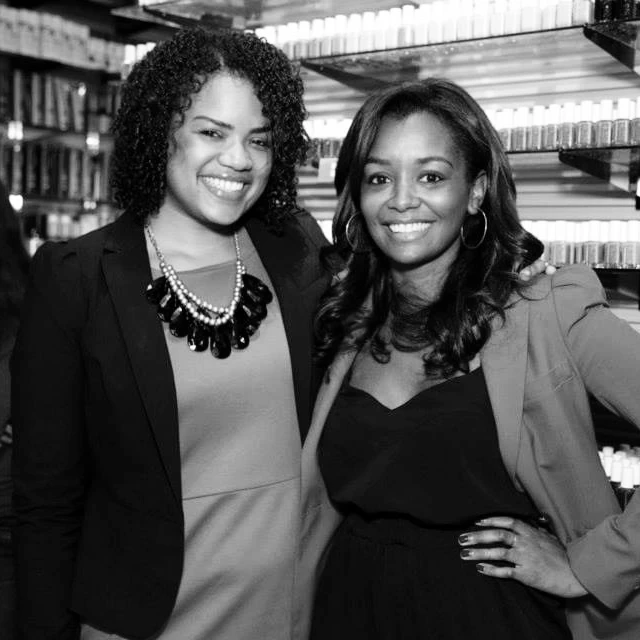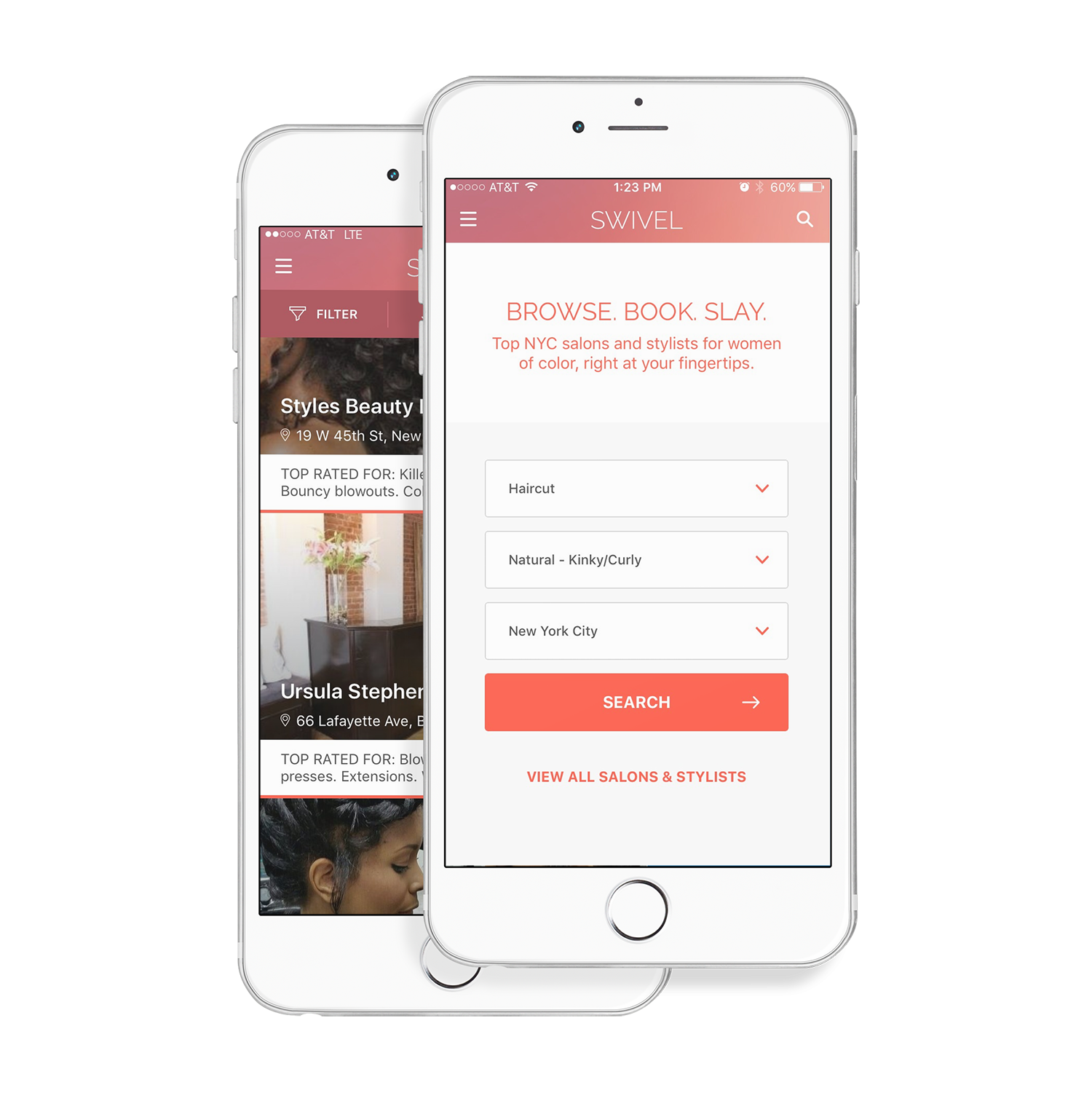Last August, a TODAY Show segment went viral for a beauty attempt gone wrong. In the clip, a stylist tried to fashion a black model’s curly locks into a high side ponytail, with the results a frizzy, peculiar mess.
The internet erupted into criticism, with news outlets, women’s magazines, and beauty bloggers wondering why the contributor failed to research how to treat and style textured hair. It was quickly labeled “cringe-worthy,” “embarrassing,” and “downright offensive.” Essence magazine called it a “hilarious yet horrifying” hairstylist’s attempt at “manhandling” African-American hair.
For women of color, the segment wasn’t an isolated incident; they’ve experienced first-hand hair stylists’ gaps of knowledge. Many of them know they can’t just waltz into any salon on the street and expect a trained professional to know what to do.
“People who don’t have this issue don’t recognize how big of a problem it is for women of color to find the right stylist,” says Jihan Thompson, cofounder of Swivel Beauty, which attempts to solve this precise issue.

Thompson, along with childhood friend Jennifer Lambert, launched Swivel in 2016 as a way for African-American women to locate hairstylists equipped to handle their needs. The commission-based appointment booking and review app lists recommended salons and stylists who have been vetted for their work on ethnic hair. One can sort by desired service (cornrows, braids, extensions, etc.) and texture type (curly, kinky, relaxed). The tagline reads: “The struggle is no longer real.”
Lambert and Thompson know the struggle all too well. The pair said that they would spend months attempting to find stylists whenever they moved cities, or researching for hours whenever they went on vacation or on a business trip. For many African-American women, for whom salons are a weekly visit, locating a salon can be an extensive (and expensive) endeavor, with plenty of failed appointments along the way.
“Black women have curly, kinky, textured hair that is just not easy for every hair stylist to do,” explains Lambert. “It requires special training that isn’t generally taught in beauty school.”

The duo report being declined by traditional salons for something as simple a blowout. “It’s pretty common,” says Thompson, who reports that, on average, 15% of traditional stylists turn away clients who have textured hair.
Other times, as model Sinead Bovell recently wrote in Allure, salons might charge double the price for “more challenging” African-American hair.
Since African-American hair encompasses so many different textures, it’s not as if friends can easily recommend the salon they go to. (Lambert admits she’s more likely to spot a random stranger on the street whose hair she likes and ask her where she gets it done.)
Thompson says the women she comes across feel like they never had an easy route to beauty, be it makeup or hair. “A lot of times they just gave up. They felt the beauty industry overlooked their needs, and treated them like an afterthought.”
Oversight when it comes to diversity has often been an issue within the beauty industry. But in the last few years, a crop of new startups attempted to even the playing field. MatchCo, for example, is a fully customized foundation app that can match any skin tone. Even big retailers are catching on: Sephora now carries Briogeo, a natural hair care line of texture-specific products made for a diverse array of hair types.
Thompson sees a lack of diversity in certain beauty sectors, but recognizes that in general, “people solve their own problems.” She isn’t counting on Silicon Valley to look out for her community–not that mainstream startups purposely shun minorities, rather they’re just unaware and don’t understand specific pain points.
“But we understand it—infinitely,” stresses Thompson. “That’s why we started this.”
From Friends To Business Partners
Jennifer Lambert and Jihan Thompson became friends as children living in Washington, D.C,. in the ’90s; the friendship lasted through college, graduate school, and different career paths. Lambert, a graduate of Harvard School of Law, went on to become an attorney specializing in mergers and acquisitions. Thompson attended the University of Pennsylvania and pursued a career in publishing, serving as an editor at publications such as Marie Claire, Redbook, and O, The Oprah magazine.
As each moved to new cities for work, they called one another to complain about a top priority: finding someone who could do their hair. Lambert, for example, recalls traveling to her hometown every weekend just for her salon.
“We hear a lot from black women: ‘Once I found my apartment, the next thing I look for is my hair stylist’,” reports Thompson. Oftentimes, she says, women just resign themselves to “going through life with subpar solutions.”
The two friends were content with their careers, but Thompson’s satisfaction started to morph the longer she worked at O, The Oprah Magazine. She recalls interacting with “so many people doing creative things” through interviews and shoots, and wondered if she too possessed a more expressive side. That, coupled with the 2015 beauty tech explosion, inspired her think of whether she could combine the two: creativity and technology.
Thompson, for example, was intrigued by the on-demand beauty apps–such as GlamSquad–in which consumers could have their hair or makeup done in the luxury of their own home. She too wanted that luxury, “but the no. 1 thing that stopped me [from booking] was thinking, ‘oooh, can they do my hair?'” she says. “It always felt like a stopping point.”
With that hesitation, the idea of Swivel Beauty was formed. Thompson roped in her childhood friend to research how technology could help solve minority beauty problems.
“We thought: why don’t we do something?” recalls Thompson.
For the latter half of 2015, the friends committed to meeting every weekend to work on the project. Then, as weeks turned into months, they began attending tech events and meetups in an effort to learn as much about the space as possible.
They also, through their own contacts, reached out to stylists and salons, asking how they target their desired market. And then, by the end of the year, the duo emailed 500 women–some friends, some acquaintances–about what they’d want to make locating salons a more seamless affair.
Lambert and Thompson felt confident that not only was there a market for their app, but that the app held a cultural importance. They felt ready, but taking the leap to commit 100% and finance it still left them within the concept phase. That changed when the two went to the Rent the Runway entrepreneur summit in the winter of 2015. There, amongst a sea of female entrepreneurs, they felt like they had no excuses. It energized them to quit their jobs and get serious.
“We walked out of there saying, ‘OK, no more talking about it. No more bullshit,” recalls Thompson. “We are going to do this.”
Growing Their Business
At the start of 2016, the two quit their day jobs and used their own savings to pursue their passion. They began by acquiring a network of mentors who could guide them through their first brush with entrepreneurship. Through these contacts, they ultimately began meeting engineers, reading up on tech book recommendations, and scouting developers.
Related: This Is How Some Black Women Are Skirting Racism And Sexism To Find Funding
They then began the vetting process, which stemmed from recommendations from friends. They personally followed up, checking each salon for quality of work, timeliness, and professionalism.
Not everyone makes the cut, notes Lambert. “There are some [salons] that can be ruled out even before a meeting. You can look at someone’s Instagram [account], spot a really bad weave and know that you can’t recommend anyone go there.”
Once approved, Swivel Beauty takes a percentage of each booking or packages. (The company declines to report the specific amount, which varies.)
Finally, in the fall of 2016, Thompson and Lambert launched Swivel Beauty with 15 salons and stylists in New York City. Last year, Swivel Beauty went through the prestigious Sephora accelerator program. Today, less than a year later, there are over 150 recommended stylists, with over 10,000 downloads.
“Instagram has been huge in getting the word out,” says Thompson, but notes that word-of-mouth is still their number one referral.
For salons and stylists, Swivel Beauty screens clients, thereby helping refer them to the exact expert who can tend to their needs. “They do the preliminary work, it takes a lot of the guesswork out of pairing,” says New York City hairstylist Ashley Lee. “And it’s easy marketing [for us].” Lee reports that she’s seen an increase of 20% in new, long-standing clients since using the app in the last year.
The company now has four full-time staff members and is actively looking for investors. In the next few months, Swivel Beauty will launch in Chicago and D.C., two locations the cofounders know well and have extensive contact lists in. They are still bootstrapping though; the women report that D.C. is next not only because of its demographic, but also because they have free housing there–at their parents’ homes.
“We’re being strategic about [expansion],” says Thompson. “As a young startup, we have to be scrappy.”
The cofounders say their goal is to expand in the U.S., and even internationally. But they are steadfast in their commitment to hair, with no plans to move beyond the sector. They recognize how important it is to under-served communities.
“When you have a good hair day, everything is better. You have that extra pep,” says Lambert. “So we’re really focused on solving that problem for our customers.”
As Thompson explains, they just want minority groups to have the same ease as their counterparts. It makes life, she says, so much more manageable.
“If you want to have that salon experience, you should have an easy way to be able to find the right stylist,” she says. “People have a solution now.”
Recognize your brand’s excellence by applying to this year’s Brands That Matter Awards before the early-rate deadline, May 3.
